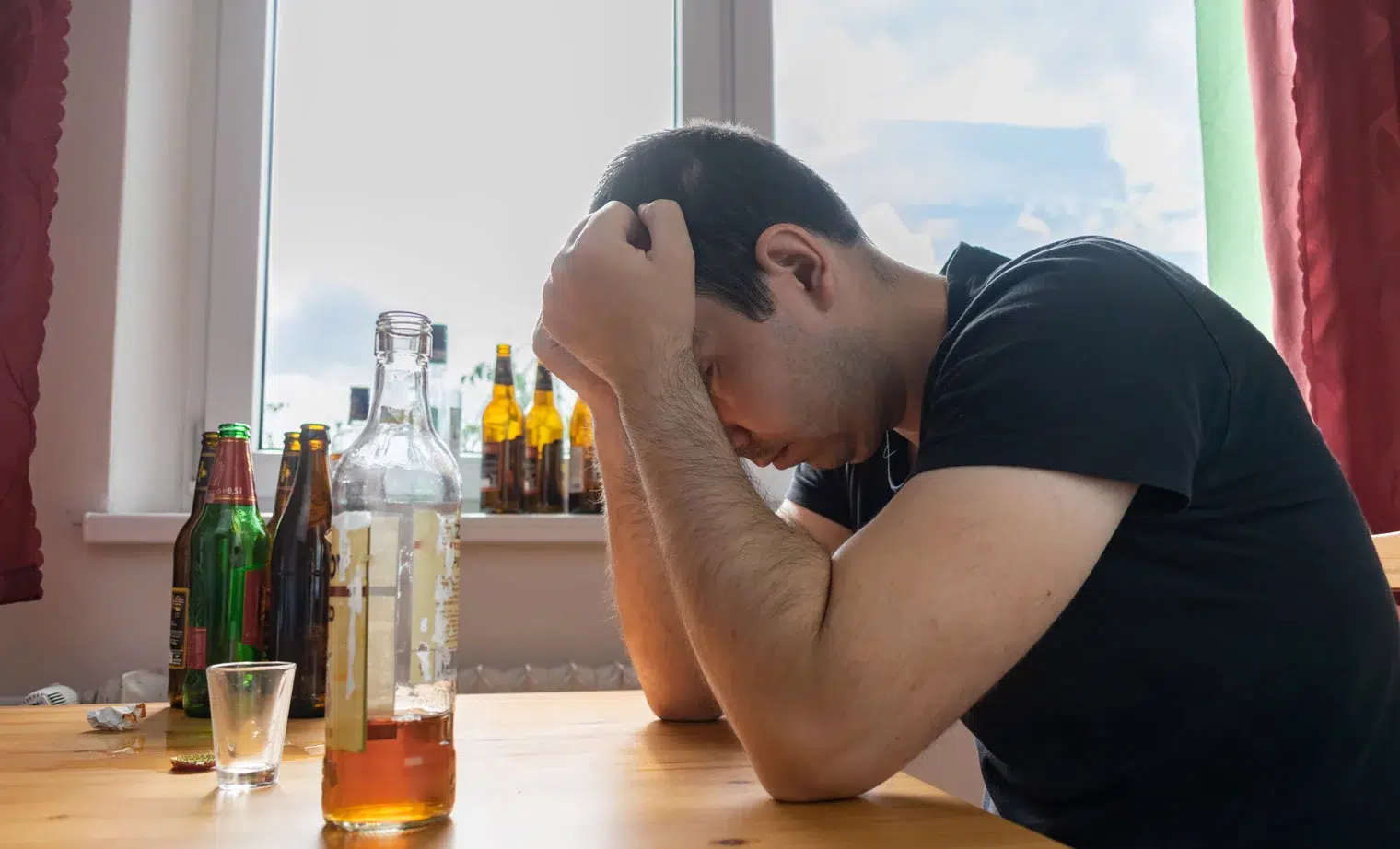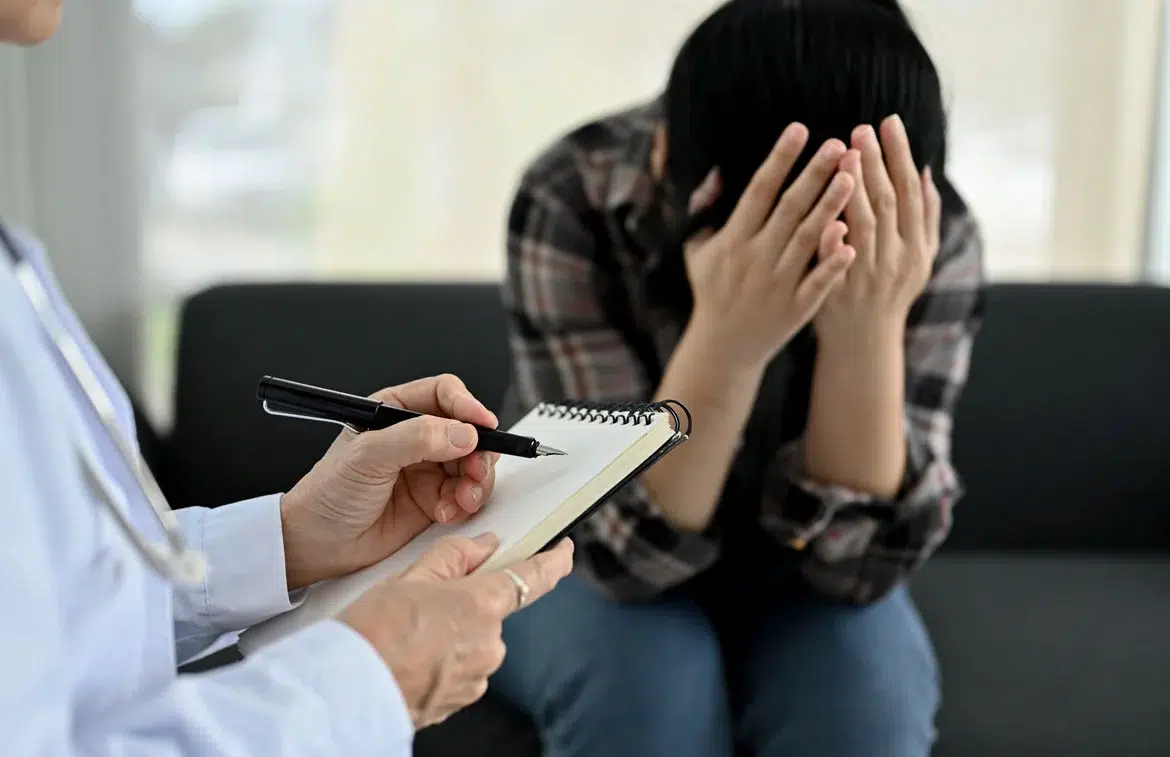Effective Treatment for PTSD and Alcohol Abuse
Table of Contents
Are you struggling with PTSD and alcohol use disorder? People with PTSD often abuse alcohol in an attempt to deal with their PTSD symptoms. This never works in the long run and can actually make PTSD symptoms worse. In this article, we tell you what does work and how you can get help for both of these issues.
Keep reading to learn more about effective forms of dual diagnosis treatment, and how Emerald Isle can help you turn over a new chapter in your life!
PTSD and alcohol use disorders
Post-traumatic stress disorder (PTSD) and alcohol use disorders have a complex relationship with one another. Studies suggest that those struggling with PTSD are more likely to engage in excessive drinking or have alcohol dependence, particularly when individuals attempt to self-medicate their symptoms of anxiety, depression, and hyperarousal. At the same time, people who suffer from substance use disorders such as alcoholism have an increased risk of developing PTSD after a traumatic event.
When it comes to PTSD and alcohol abuse, there is evidence that suggests they can perpetuate each other in what is known as a “vicious cycle”. For instance, engaging in excessive drinking may increase one’s risk of being exposed to new trauma which could then lead to an increased risk of developing PTSD.
Furthermore, those living with PTSD may be more likely to turn to alcohol as a form of escape from their difficult emotions, which can worsen PTSD symptoms. This can create a cycle wherein individuals drink heavily in order to cope with the symptoms of their disorder which, over time, only serves to exacerbate the symptoms and leads them back into drinking as a coping mechanism.
The importance of treating alcohol use disorder and PTSD at the same time
It is crucial for those struggling with both PTSD symptoms and alcohol abuse to seek treatment for both conditions simultaneously in order to break the vicious cycle they have created.
Studies indicate that individuals who receive concurrent treatment for both disorders are much more likely to experience positive outcomes than those who only treat one or the other. Treatment options include individual and group therapy, medication management, lifestyle changes such as avoiding triggers and participating in healthy activities, and 12-step programs.
If you or someone you know is struggling with PTSD and/or alcohol abuse, seek professional help. Emerald Isle Health & Recovery can help you begin to break the cycle of PTSD and alcohol abuse and start on the path toward healing.
Confidential PTSD Assessment
What causes Post Traumatic Stress Disorder?
Post Traumatic Stress Disorder (PTSD) is an anxiety disorder that can develop after a person has experienced or witnessed a traumatic event. It can manifest itself in physical, emotional, and psychological changes, such as flashbacks, intrusive thoughts and memories, depression, difficulty concentrating and sleeping, hypervigilance and irritability. Symptoms of PTSD can surface weeks or even months after the trauma occurred and may become worse over time if left untreated.
There are many theories on how someone develops PTSD. One theory suggests that when a person experiences extreme fear or helplessness during a traumatic event they become overwhelmed by their emotions and unable to process them properly leading to post-traumatic stress. Other theories postulate that post-traumatic stress is a result of biological or genetic factors, environmental influences such as childhood abuse or neglect, and even the individual’s own beliefs and attitudes about traumatic events.
What Causes someone to develop PTSD?
The type of trauma experienced can also play an important role in developing post-traumatic stress disorder. Traumatic events that involve violence or the threat of harm are more likely to cause post-traumatic stress than other types of traumas such as natural disasters or accidents. Additionally, some people may be more vulnerable to post-traumatic stress due to their unique biology, history, personality traits, and life experiences.
Examples of common traumatic events that may cause PTSD include combat, physical or sexual assault, natural disasters, accidents, or any other life-threatening event. Other events that may cause PTSD include experiencing domestic violence, childhood abuse and neglect, and being a victim of bullying.
Even the sudden death of a loved one can lead to PTSD in some cases. Additionally, those who work in high-risk occupations—such as law enforcement officers or first responders—are at increased risk of developing PTSD due to the potential for facing high levels of violence or tragedy on the job. Almost any traumatic event can trigger PTSD.
What are PTSD symptoms?
Post-traumatic Stress Disorder (PTSD) is a mental health condition that may develop after a person experiences or witnesses a traumatic event or traumatic events. Symptoms of PTSD include nightmares, flashbacks, intrusive thoughts, difficulty concentrating and sleeping, nightmares, and feeling emotionally numb. Not all people who experience traumatic events will develop PTSD symptoms; however, for those who do, the effects can be debilitating.
Flashbacks
One of the most common symptoms associated with PTSD is re-experiencing the trauma through flashbacks or nightmares. Flashbacks are vivid recollections of traumatic events that may come suddenly and without warning.
They often feel as if they are happening in real-time and can cause intense feelings of distress. Nightmares are also common among people with PTSD and can involve dreams that are related to the traumatic event or just simply cause feelings of fear, dread, and anxiety.
Intrusive thoughts
Intrusive thoughts can be another symptom of PTSD. When someone has intrusive thoughts, they frequently replay memories from the trauma in their mind. These intrusive thoughts may come with strong emotional reactions such as fear or anger, making it difficult for a person to focus on their daily tasks.
Difficulty sleeping
Difficulty sleeping is common among those with PTSD, often leading to insomnia and excessive tiredness during the day. Those with PTSD may also experience physical symptoms such as headaches, muscle tension, dizziness, fatigue, and difficulty breathing.
24 Hour Inpatient Rehab Hotline
Emotional numbness
Finally, many people with PTSD have difficulty feeling emotions or may feel emotionally numb. This can result in a sense of detachment from the world around them, making it difficult to experience joy or happiness.
These symptoms vary greatly from person to person and should be discussed with a doctor if they persist for long periods of time. With proper treatment, including therapy and medication, individuals can learn how to manage their symptoms and lead fulfilling lives.
What are Effective Treatments for PTSD?
Treatments for post-traumatic stress disorder (PTSD) vary depending on the individual and their unique needs. If you also have alcohol use disorder or other co-occurring disorders, treatment may be different than the approach used if you have PTSD without any form of alcohol use disorder.
There are several common treatments that may be beneficial in managing the symptoms of PTSD. Here is an overview of some of the most frequently used treatments for post-traumatic stress disorder.
Cognitive Behavioral Therapy (CBT)
Cognitive Behavioral Therapy (CBT) is one of the most popular treatments for PTSD. It involves working with a therapist to address how thoughts and behaviors impact emotions. CBT helps individuals identify negative thinking patterns and provides tools to help them make positive changes in their behavior.
This type of treatment focuses on helping individuals cope with the symptoms of PTSD by gradually exposing them to memories of the trauma. Through this process, individuals can learn how to better manage their symptoms and develop healthier coping strategies.
Exposure Therapy
Exposure therapy is a type of cognitive behavioral therapy used to treat PTSD. This treatment involves exposing an individual to memories or reminders of the traumatic event in a safe and controlled environment. This helps to reduce the fear response associated with PTSD, allowing individuals to manage their symptoms more effectively. During exposure therapy, therapists may use a variety of techniques such as role-playing, guided imagery, virtual reality, and/or visualization.
Eye Movement Desensitization and Reprocessing (EMDR)
Eye Movement Desensitization and Reprocessing (EMDR) is a therapy that is used to treat PTSD. This treatment involves having the individual focus on bilateral stimulation, such as side-to-side eye movements or hand tapping, while recalling the traumatic event. This type of therapy helps individuals process the traumatic event and learn to cope with PTSD symptoms. EMDR can be a helpful tool for reducing PTSD symptoms, such as flashbacks or intrusive thoughts.
Medications that can help with PTSD
Medication may also be an effective treatment option for PTSD. Certain antidepressants, such as selective serotonin reuptake inhibitors (SSRIs) or serotonin-norepinephrine reuptake inhibitors (SNRIs), have been found to be effective in reducing post-traumatic stress disorder symptoms.
Other medications, such as benzodiazepines and antipsychotics, may also be used to manage post-traumatic stress disorder symptoms. Medication can help to reduce post-traumatic stress disorder symptoms, such as anxiety and depression, allowing individuals to engage in other treatments more effectively.
The connection between substance abuse and mental health
Substance abuse and mental health problems are closely linked and are known as co-occurring disorders. Generally speaking, certain mental health conditions can increase vulnerability to substance use disorders, while substance abuse can lead to or exacerbate existing mental health issues.
The National Institute on Drug Abuse (NIDA) notes that mental health disorders are among the most common risk factors for developing a substance use disorder. People with mental health issues may turn to drugs and alcohol in an attempt to self-medicate, often leading to alcohol addiction or drug addiction and the worsening of their underlying psychological condition.
Research indicates that people with certain mental health disorders are more likely to suffer from substance abuse than those without. Examples of such conditions include depression, anxiety, bipolar disorder, attention-deficit/hyperactivity disorder (ADHD), schizophrenia and post-traumatic stress disorder (PTSD).
Immediate Placement for PTSD Treatment
Risk Factors for a Mental Health Condition
Conversely, the misuse of substances can lead to mental health problems. Alcohol, opiates, benzodiazepines and stimulants are known to have a depressant effect on the brain, leading to feelings of depression or anxiety when used long-term. Stimulant use can also lead to an increased risk of developing psychotic symptoms, such as paranoia and hallucinations. Long-term substance abuse has also been linked to an increased risk of developing dementia.
Not everyone with a substance use disorder will experience mental health problems, nor will everyone with mental health disorders suffer from addiction. However, these two issues often go hand-in-hand, and it is important to recognize the connection between them in order to provide effective treatment.
Treatments for mental health problems and substance use disorders should address both conditions simultaneously. This is known as integrated treatment, which aims to treat an individual’s mental health and substance use disorders concurrently.
PTSD and binge drinking
Binge drinking is defined as consuming five or more drinks (four drinks for women) within a short period of time and can be especially dangerous when combined with PTSD. For individuals living with post-traumatic stress, this can serve as a form of self-medication to cope with intrusive symptoms or flashbacks, providing temporary relief but putting them at risk over the long term.
The co-occurrence of PTSD and heavy drinking can lead to a host of physical, psychological, and social problems. This includes an increased risk of alcohol use disorder (AUD), as well as other mental health issues such as depression and anxiety. When someone with PTSD engages in heavy drinking they may be more likely to become violent or engage in risky behavior, putting themselves in dangerous situations.
Alcohol Treatment Options – Call Now!
Get professional treatment for PTSD and alcohol abuse
Get professional help for PTSD and alcohol abuse because, without it, symptoms will worsen over time. PTSD and alcohol abuse can both cause serious physical, emotional, and mental health issues. Professional help can provide individuals with the tools they need to better manage their symptoms, learn coping strategies to prevent relapse, and develop healthier habits.
Professional PTSD treatment can provide individuals with a supportive environment in which to share their thoughts and feelings without judgment. This can be particularly useful for people who are struggling with PTSD and alcohol abuse since both conditions often lead to feelings of isolation.
Both PTSD and alcohol addiction can be addressed effectively with the right help. Call Emerald Isle Health & Recovery now for a confidential discussion of options. Hope is here and waiting, if you would like a solid foundation for starting a new life, reach out now!





